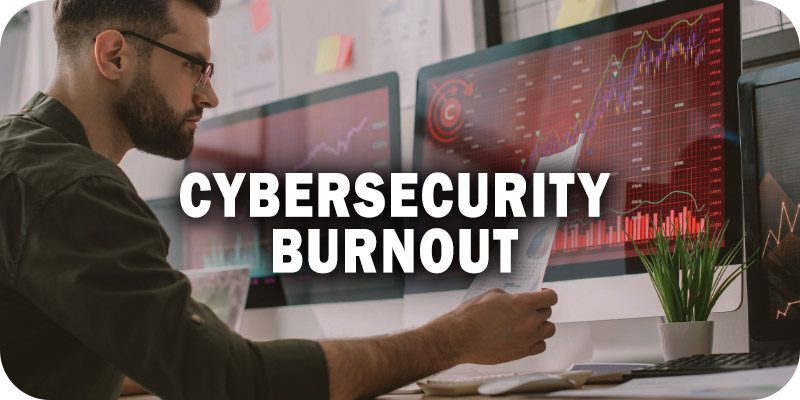4 Common Causes of Cybersecurity Burnout to Watch For


The editors at Solutions Review team up with ManageEngine to discuss common causes of cybersecurity burnout and how to counteract the effects.
Cybersecurity burnout is a phenomenon that occurs when cybersecurity professionals experience physical and emotional exhaustion, a lack of interest or motivation, and negative or cynical attitudes toward work. Several factors, including high workloads, high pressure, monotonous work, and limited resources, can cause this condition. The constant demand for cybersecurity and the critical nature of the work can create a highly stressful environment that can contribute to burnout.
Cybersecurity burnout can have serious consequences, including decreased productivity, lower quality work, and higher turnover rates. To counteract burnout, employers can promote work-life balance, provide support, promote career growth, rotate tasks, and foster a positive work environment.
Learn how technology can help combat cybersecurity burnout and keep IT teams happy in this free e-Book from ManageEngine.
Cybersecurity Burnout: Common Causes and Strategies to Counter It
Here are some common causes of cybersecurity burnout:
- High Workloads: Cybersecurity professionals often have to work long hours, and are frequently on call 24/7 to monitor for cyber threats. This can lead to a sense of overwhelm and exhaustion.
- High Pressure: The consequences of a cybersecurity breach can be catastrophic, resulting in financial loss, reputational damage, and legal liabilities. This can create a highly stressful environment that can contribute to burnout.
- Monotonous Work: Cybersecurity can be highly repetitive, with security analysts having to perform the same routine tasks day in and day out. This can create a sense of boredom and lack of engagement, leading to burnout.
- Limited Resources: Many cybersecurity teams are underfunded and understaffed, leading to a high workload for individual professionals. This can lead to burnout as individuals are expected to take on too much responsibility.
To counteract burnout, here are some strategies that can be employed:
- Encourage Work-Life Balance: It’s important for cybersecurity professionals to take breaks and enjoy non-work activities to prevent burnout. Organizations can promote this by providing flexible schedules, allowing employees to work from home, and encouraging them to take time off.
- Provide Support: Cybersecurity professionals need support from their employers, including adequate resources, training, and recognition for their hard work. Employers can also provide access to employee assistance programs (EAPs) and other mental health resources.
- Promote Career Growth: Providing cybersecurity professionals with professional development opportunities can help keep them engaged and motivated. This can include training programs, mentorship, and career advancement opportunities.
- Rotate Tasks: Cybersecurity professionals can get bored with performing the same tasks repeatedly. Rotating assignments can help keep them engaged and motivated while broadening their skillset.
-
Foster a Positive Work Environment: Employers can create a positive work environment by promoting open communication, providing a sense of purpose, and recognizing the importance of work-life balance. This can help create a supportive and engaging workplace to prevent burnout.
By taking these steps, organizations can help prevent burnout and support their cybersecurity professionals’ mental health and well-being.






















